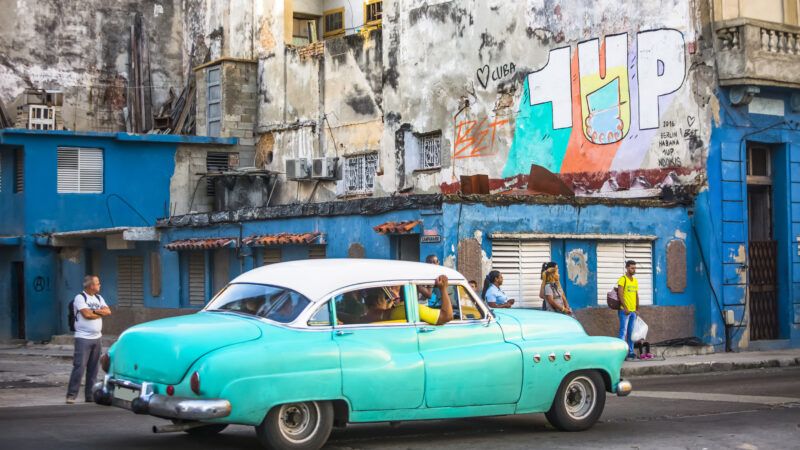Biden Is Right: We Shouldn't Restrict Americans in the Name of Liberating Cuba
A new White House policy faces one of the most malignant foreign policy objections: that it's not a magic wand for regime change.

The White House on Monday announced welcome changes to America's long-contentious policy toward Cuba. It will now be easier for Americans to travel and send money to the communist island, and easier for Cubans to escape to the United States.
The move reinstates the Cuban Family Reunification Parole Program, which from 2007 to 2016 allowed up to 20,000 Cubans per year to come and stay in the U.S. while applying for permanent legal resident status. It also removes the $1,000-per-quarter restriction on how much money Americans can send to family, friends, and private entities across the Florida Straits.
The liberalizations, which followed a lengthy policy review, came under attack not just from Republicans, for whom (with the exception of the occasional Jeff Flake) support of the six-decade U.S. embargo has become a litmus test, but also from the influential Cuban-American chair of the Senate Foreign Relations Committee, Bob Mendendez (D–N.J.). Menendez's arguments, versions of which are common to foreign policy discussions of countries like Russia and China, are worth considering at length.
"Today's announcement risks sending the wrong message to the wrong people, at the wrong time and for all the wrong reasons," the senator declared in a statement. "I am dismayed to learn the Biden administration will begin authorizing group travel to Cuba through visits akin to tourism. To be clear, those who still believe that increasing travel will breed democracy in Cuba are simply in a state of denial. For decades, the world has been traveling to Cuba and nothing has changed. For years, the United States foolishly eased travel restrictions arguing millions of American dollars would bring about freedom and nothing changed. And as I warned then, the regime ultimately laughed off any promises of loosening its iron grip on the Cuban people and we ended up helping fund the machinery behind their continued oppression."
It is rare to stuff so many bad foreign policy arguments into one paragraph. Start with this notion—simultaneously a strawman, an unreasonable standard, and a bait-and-switch—of travel (or any other normal human exchange) breeds democracy and brings out freedom.
It's a strawman because those arguments are absent (in both the particular and the general) from the policy change.
It's an unreasonable standard because it requires the success or failure of a given U.S. policy to be measured by whether a totalitarian country becomes free, which renders as futile most State Department exertions—including the six-decade U.S. embargo on Cuba. "With God's help," then-President Donald Trump said in 2017 while re-tightening the embargo, "a free Cuba is what we will soon achieve." Wrong!
And it's a bait-and-switch because it takes as a normal policy baseline that the U.S. government can forbid its own citizens from traveling to other countries. That is in fact vanishingly rare, and morally outrageous. There are no Washington-imposed restrictions on Americans traveling to communist China, communist Vietnam, communist Laos, or even communist North Korea, let alone to non-communist totalitarian states such as Saudi Arabia. As Flake told Reason in 2011, "If someone's going to limit my travel, it should be a communist, not my own government."
Lifting government prohibitions on the movement and trade of Americans is a good policy in and of itself, regardless of impact on captive peoples abroad. But is the impact of increased travel and remittances on balance good or bad for Cubans?
Menendez argues that "nothing changed" as a result of Barack Obama's decision to ease restrictions. By the unreasonable standard of regime change or even significant liberalization, the senator is correct. But by the standard of measurable differences in living conditions and relationship with the government, things indeed changed. As I wrote after visiting the island in 2016 for the first time in 18 years:
A noticeable segment of the population has gained at least some financial and experiential independence from the police state. They are not, in my observation, spending that extra money on flower arrangements for the Revolution. As Sen. Jeff Flake (R–Arizona) told us during our visit, "You have about 25 percent of Cubans who work fully in the private sector….The big change is the number of Cubans being able to not have to rely on government and therefore can hold their government more accountable."
While the government since then has not behaved more accountably, Cuban citizens have gotten more bold in their protests. And now, they will once again have the opportunity to be less impoverished, with a greater percentage of their income coming from non-governmental sources. Allowing for the increase of individual autonomy in one of the most repressive countries on earth is also a good in and of itself.
Menendez's statement nods toward the potential universality of his foreign policy vision: "Today is another reminder that we must ground our policy in that reality, reaffirm our nation's indiscriminate commitment to fight for democracy from Kyiv to Havana, and make clear we will measure our success in freedom and human rights and not money and commerce."
That logic, applied evenly, suggests at minimum the dismantling of the World Trade Organization and the imposition of travel restrictions on Americans seeking to visit not just Havana but the more than 60 countries categorized by Freedom House as "not free." Menendez would never openly advocate such an approach, because that approach would be both politically suicidal and logically insane.
Cuba has long been the crystallization of America's worst foreign policy instincts. Good on the Biden administration for easing that somewhat. Now it's time to recognize just how persistent and globe-spanning some of those bad instincts can be.


Show Comments (35)